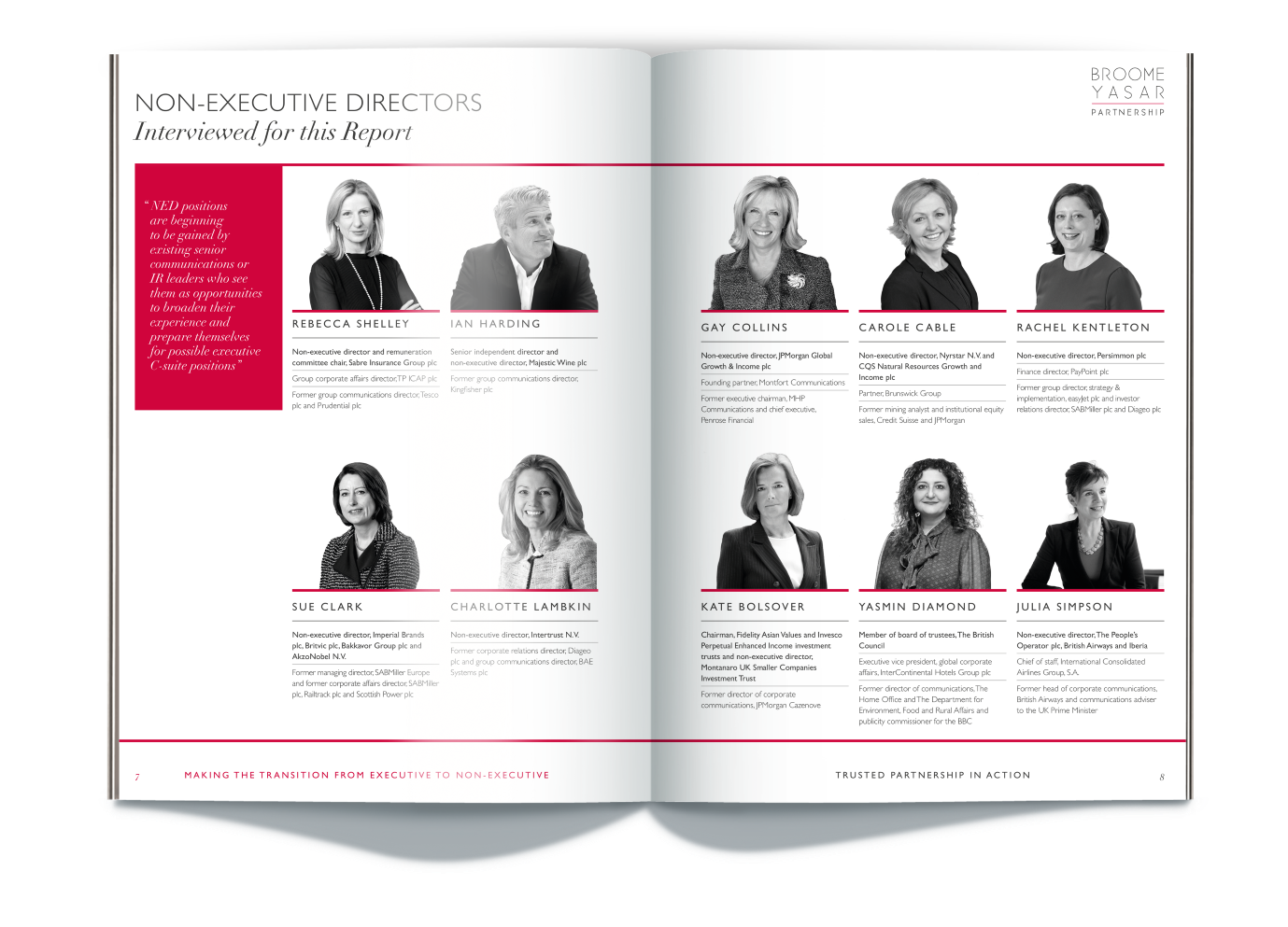NEWS
How to Transition to a Non-Executive Role
Increasing numbers of corporate affairs and investor relations leaders are securing non-executive Board positions.
Our analysis uncovers why this is happening, and how you can capitalise on the opportunity.
Download our full primary research report: Making the Transition from Executive to Non-Executive

The Non-Executive Director
For generations, a non-executive directorship (NED) offered a cosy way for a certain type of corporate executive to add a bit of claret-swilling class to their career. The prestige of the role was high but the demands were often moderate – an eye cast over the balance sheet once a quarter and a small, verbal contribution to the Board’s collective oversight – and true accountability for failures was rare.
The fundamental requirement was simply the ability to assess, from a studied distance, the essential seaworthiness of the company ship. If you were the type of executive who found P&Ls inherently beguiling – an experienced leader in legal, finance, accounting or marketing, for example – you fitted the desired profile perfectly.
How times have changed. The two great corporate-governance disasters of the Noughties – Enron (2001) and the global financial crisis (2008) – prompted a regulatory torrent that not only tightened the rules of corporate engagement, but in many cases specifically named the Board of Directors as guarantors of corporate compliance. In a stroke, NEDs were transformed from ceremonial figureheads and overseers to people actively involved in directing company activity, held liable for the firm’s accurate financial reporting, risk-management practices, bribery and fraud prevention, and much more.
That transformation in expectations has led, unsurprisingly, to a sudden demand for non-executive Board members with experience in ethical business practices, sustainability and social justice. Added to the other great paradigm shift in executive and investor thinking over the last decade – the recognition that corporate “seaworthiness” in the digital age is as much about reputational strategy as ledger strength – and little wonder we have seen increasing numbers of senior corporate affairs, communications and investor relations leaders being invited to take up non-executive roles in recent years.
 How do you take advantage?
How do you take advantage?
In our primary research report, From Corporate Affairs & Investor Relations To Non-Executive Director, senior high-flyers in corporate affairs and investor relations told us how they had personally grasped this extraordinary opportunity to broaden their executive experience –and their operational impact – by becoming NEDs. They had many recommendations for industry peers wanting to follow the same path, including:
- Pursue an industry you know: There are no set disciplinary criteria for becoming a NED – it’s open to all professions (although financial acumen is still the most crucial skillset). But sector experience is usually considered a sine qua non, especially in highly technical industries like manufacturing or financial services.
- Look at stepping stones via unconventional positions: Broadening the range of organisations you consider might furnish you with what you otherwise lack in experience. For example, taking up a NED role at a start-up can be a real education in genuine sink-or-swim financials, as well as being professionally fulfilling and an excellent way to get shirtsleeves-rolled-up experience.
- Leverage your most relevant expertise: Communication skills are ones everyone thinks they already have, so what else do you have to offer? For example, IROs can usually point to financial acumen and a deep understanding of the rhythm of corporate life (annual meetings, remuneration committees, etc.). Corporate affairs leaders are often well connected to regulators and policymakers. Both usually have robust experience in group strategy and external stakeholder management. You should also look to weight your executive day job towards those skills that are the very definition of a NED role – notably risk management and corporate governance. The more you can point to having built defined success in these areas, the more attractive you become as a non-executive director.
- Zero in on board committee roles: Board committees are smaller groups of board members who focus on specific issues or areas of responsibility. Common ones include corporate-social-responsibility committees, risk-management committees and audit committees. These expertise-driven positions can often provide neat openings for ambitious corporate affairs and investor relations executives.
- Understand the interpersonal element: The people dynamics of a board of directors are very different from those of an executive committee. Most obviously, the latter is often competitive to the point of being cut-throat, whereas the former is usually deeply collaborative. Indeed, relationship-building with fellow board members is so important to the role, it provides a potential route in: Build a strong enough relationship with a board member today, and you’re more likely to prove that you have what it takes to be their fellow NED.
- Get formal training: It’s also vital to understand the formal tasks of a board member versus those of an executive director. For aspiring NEDs who want to get to grips with this, structured development programmes are available, and can really help prepare you for the unique requirements of the role. The Financial Times, for example, offer half-day and full-day workshops for executives looking to become NEDs, Cranfield offers a 3-day seminar, and there are many other such programmes on the market. For those wishing to go even further, The FT even offers the Non-Executive Director Diploma – a six-month course leading to an accredited, post-graduate-level qualification.



